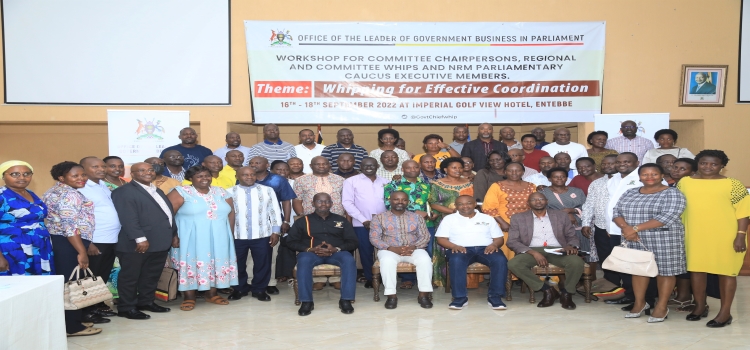The workshop The leadership of Parliament committees have completed a two-day workshop intended to perfect their proficiency in conducting their legislative and oversight roles.
Organised by the Office of the Leader of Government Business in Parliament from Saturday, 17 to Sunday 18 September 2022 at the Imperial Golf View Hotel, Entebbe, the workshop was attended by committee chairpersons, regional and committee whips and National Resistance Movement (NRM) caucus executive members under the theme: “Whipping for effective coordination.”
The Deputy Speaker, Thomas Tayebwa, who referred to the committees as the engine of the Legislature, said that they [committees] need constant training to perfect their roles.
“The bulk of the work of Parliament is done in committees. Therefore, the realisation of the Legislature’s vision as a people-centred Parliament is largely hinged on the responsiveness, efficiency and effectiveness of committees as sub-sets of the House,” Tayebwa said.
The Deputy Speaker observed that business drags on for long in committees, while some committees have hardly processed annual reports of the entities under their purview. He attributed the delay to limited prioritisation and work methods.
On the roles of committee and regional whips, the Deputy Speaker said an effective whipping system is a precondition for the success of a legislature.
“I, therefore, urge all whips to effectively play their role in mobilising members and tracking their attendance and participation in Parliament work,” he said.
The Government Chief Whip, Hon. Hamson Obua, called for a collective and open door policy amongst committee leadership for strategic coordination of parliamentary affairs. He called for cohesion and teamwork amongst committee leadership and whips through collective decision making and building cordial relationships with Ministries, Departments and Agencies (MDAs).
“I encourage members to always utilise the Office of the Government Chief Whip for coordination and knowing the position of government in matters of strategic interest especially on those matters in the committee,” he said.
The Deputy Attorney General Jackson Kafuuzi, who was one of the facilitators emphasised the role of the committees in conducting post-legislative scrutiny.
“Post-legislative scrutiny provides an opportunity to assess the impact of legislation on the well-being of all citizens and to address any unforeseen disadvantages or inequalities,” he said.
The Minister of Local Government, Hon. Raphael Magyezi, who was the main discussant on the Parish Development Model (PDM) admitted making some mistakes as government which resulted in mismanagement of some of the funds that were released.
“Part of PDM money was embezzled because it was sent to the districts – but this time around, it is going directly to the Parish SACCOs,” the minister said, adding all districts leaders who mismanaged the PDM money had been interdicted and arrested.
On the economic point of view, the Permanent Secretary/Secretary to the Treasury, Ramathan Ggoobi, advised MPs to desist the need of approving supplementary budgets which are not as a result of unforeseen circumstances.
“We need to make the budget more transformative, redistributive and less accommodative. We need to reduce supplementary budgets to restore fiscal discipline… If we don’t stamp out supplementary budgets, we are not going to change anything in this country because it distorts the budget,” Ggoobi said.
The law allows Parliament to approve a supplementary budget of up to three per cent of the appropriated national budget.
Ggoobi added that the Ministry of Finance, Planning and Economic Development has deleted the aspect of unfunded priorities in the budget because it is the one fuelling supplementary budgets.
“We shall no longer have unfunded priorities in the budget framework. When a priority cannot get resources then it ceases to be a priority. It has to wait for the next financial year,” Ggoobi said as he received applause from the MPs.
On the other hand, the Minister for General Duties in the Office of the Prime Minister, Hon. Justine Kasule Lumumba, spoke emphatically to the committee leadership on need for consensus building, saying decisions based on consensus can lead to better quality outcomes that empower the committees and caucus leadership to move forward together, to create their common future.
In their reaction, the MPs said that whereas they were alive to the functions and roles of committees in processing business for the House, they are doing so with challenges not limited to finances.
“We are curtailing the work of Parliament because committees are not given the necessary funds to run their duties…the allocation of funds cannot even allow me to do one comprehensive oversight internally,” Hon. Emmanuel Otaala, Chairperson, Committee on Environment and Natural Resources said.
In welcoming remarks, the Clerk to Parliament, Adolf Mwesige Kasaija, said the workshop which was the first of its kind for committee chairpersons of the 11th Parliament and will help to improve efficiency and effectiveness among MPs in the execution of their committee duties.
Do you have a story in your community or an opinion to share with us: Email us at editorial@watchdoguganda.com









